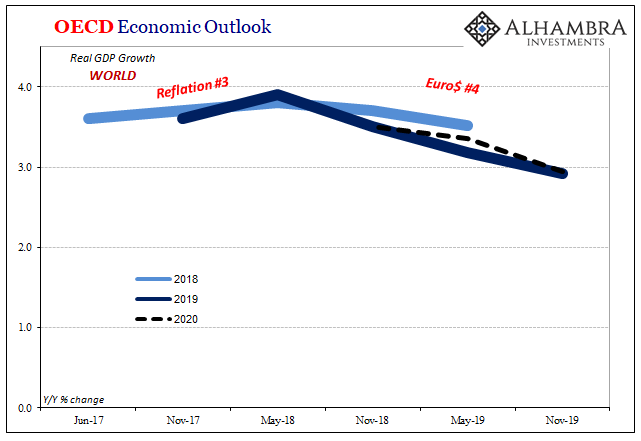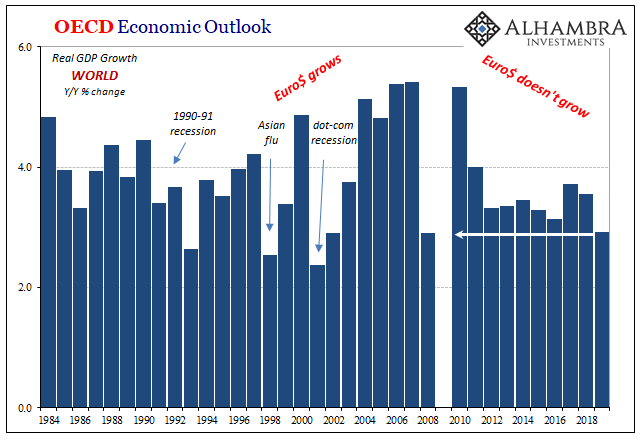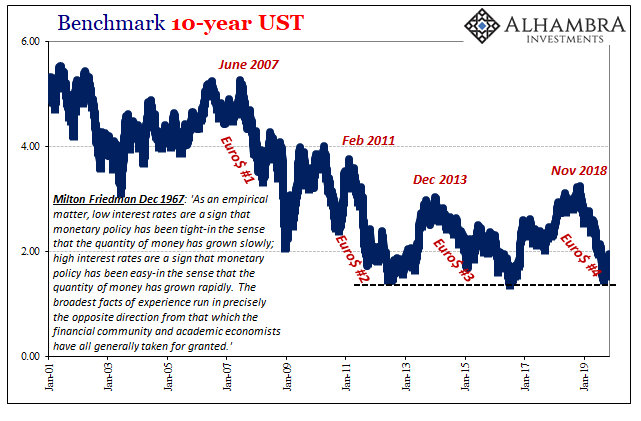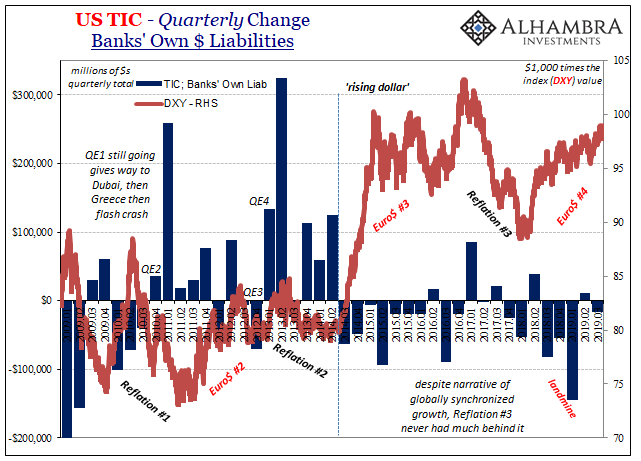Building on the theme of midpoints, the current direction of the global economy, and the prospects for a Phase 2, the OECD provides us with another timely reminder about the way in which the global economy is developing. Not the good way. Releasing revised estimates for worldwide growth, the organization figures 2019 will be the slowest since 2009.
In fact, at just less than 3% growth, that would be more like past global recessionary periods.


Going back to the immediate aftermath of 2008, the world economy only faced cyclical considerations – at least that’s what official outlets like the OECD had said. Monetary “stimulus” would be the key if populations would only give central bankers a chance. The people did, several chances, but the central bankers never delivered on those promises in any place.
Instead, the OECD among others has had to change its tune to try and account for this. These could not have been cyclical problems else that “stimulus” would’ve fixed everything, the thinking now goes. Alas, as you can clearly see above, nothing has been. The global economy seems stuck in a morass of malaise.
Thus, the narrative now shifts. The problem with the global economy isn’t clueless central bankers blindly adhering to what surely didn’t work, rather it has to be structural forces beyond their control. And that is actually true. On that initial count, the OECD gets it right.
But not completely; over here in reality, it is both those things. Failing central bankers were unable to overcome structural forces they just don’t understand even though these originate within their own purview.
For the OECD, then, one step forward in at least admitting the problem is bigger than they thought. Serious deductions, however, for grasping at structural straws:
The biggest concern, however, is that the deterioration of the outlook continues unabated, reflecting unaddressed structural changes more than any cyclical shock. Climate change and digitalisation are ongoing structural changes for our economies. In addition, trade and geopolitics are moving away from the multilateral order of the 1990s. It would be a policy mistake to consider these shifts as temporary factors that can be addressed with monetary or fiscal policy: they are structural. In the absence of clear policy directions on these four topics, uncertainty will continue to loom high, damaging growth prospects.
US officials cling to the belief (R*) that beginning, oddly, right around 2008 Baby Boomers started to retire in huge numbers, the American workforce became marginally hooked on opioids, and those who lost their jobs in the Great “Recession” suddenly became averse to reschooling. That’s their structural explanations for why QE didn’t actually create a full recovery as any common person understands one.
The OECD here adds a couple more. Trade wars are the latest along with geopolitics, combined with 19th century-style fears over mechanization (“digitalisation”) and climate change all abruptly erupted right around also 2008 in order to depress the global economy in a way that defeated all the genius “stimulus” unleashed around the world. Really?


Quantitative easing, we were always told, was the most powerful stuff ever invented and yet it can’t seem to overcome any actual hurdles. Monetary policy in particular remains as effective as ever in the official imagination no matter how many times everyone has to make increasingly bizarre excuses for it.
And it is the one aspect of the post-crisis economy that continues to be sheltered beyond all debate – monetary policy works because everyone believes it works even when it so clearly didn’t.
At least “they” are starting to see more structural issues in these darkening global economic prospects, correctly surmising that the typical “stimulus” won’t do much if anything to help this time around (though the OECD elsewhere claims that renewed QE and the like has kept things from getting worse in 2019; SMDH, already more “jobs saved”).
Identifying the real structural culprit, well, that’s obviously going to have to wait for some other year. And there’s your more turbulent geopolitics.

Stay In Touch